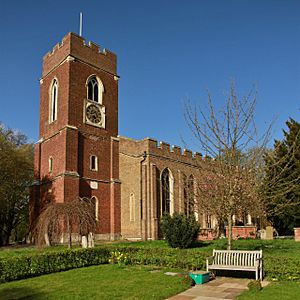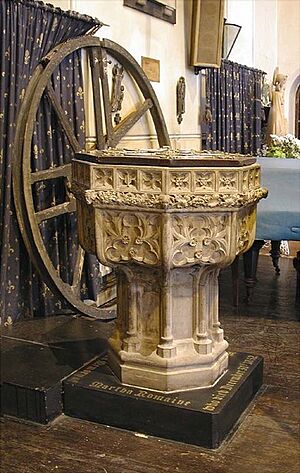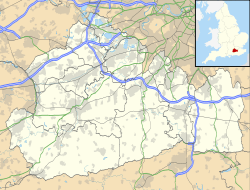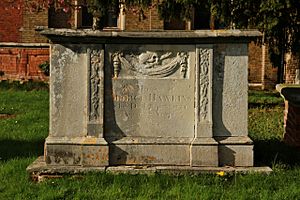St Mary's, Staines facts for kids
Quick facts for kids St Mary's, Staines |
|
|---|---|
| Parish church of St Mary, Staines | |
 |
|
| 51°26′11″N 0°31′08″W / 51.4364°N 0.5188°W | |
| Country | England |
| Denomination | Church of England |
| Website | St. Mary |
| History | |
| Dedication | St Mary |
| Architecture | |
| Architect(s) | John Burges Watson |
| Style | Gothic Revival |
| Completed | 1828 |
| Administration | |
| Parish | Staines |
| Archdeaconry | Middlesex |
| Episcopal area | Kensington |
| Diocese | London |
St Mary's Church in Staines is a special place of worship for the Church of England. It's located in Staines-upon-Thames, a town in Surrey, which is part of the Greater London Urban Area. The church belongs to the Diocese of London, which is like a large church district.
The church building sits on a small hill near the River Thames, at the western edge of the town. It's a very important historical building, recognized as a Grade II* listed building since 1952. This means it's a particularly important building of more than special interest.
Contents
History of St Mary's Church
Early Beginnings of the Building
The church stands on a small mound that offers great views of the land between the River Colne and the River Thames. This suggests that the first church here might have been built on a much older, sacred spot.
Ancient remains from the Celtic people have been found at Church Island. This island is about 200 meters (656 feet) south of the church. Before the Thames became easy to travel by boat, people could reach the island by walking across a shallow part of the river when the water was low.
Some people used to think the first church was built in the year 685 AD. However, the earliest written proof of a church building here dates back to 1179. It's possible a church existed even earlier, around 1100.
Building the Current Church
The oldest part of St Mary's Church that is still standing today is its tower. A special sign on the tower says it was designed by the famous architect Inigo Jones and built in 1631.
In the 1820s, a large part of the church building collapsed. Because of this, a new part called the chancel was started. This happened after a special local law, called the Staines Parish Church, Burial Ground and Rates Act 1827, was passed. This law allowed the old church's remains to be removed.
The main part of the church, called the nave, was designed by John Burges Watson. It has a special top edge that looks like a castle wall, called a battlement. Building on this part began in 1828. Later, in 1885, a round section with three windows was added to the chancel. The church organ was also moved to where it is now.
After the Second World War, the stone decorations on top of the tower, called pinnacles, were taken down because they were unsafe. This might have been because a bomb landed nearby during the war.
Interesting Features of the Church

Beautiful Stained Glass Windows
One special window is the Trident Memorial Window. It remembers the 1972 Staines air disaster, which was the worst plane crash in Britain before the Pan Am Flight 103 bombing in Scotland. The Bishop of Kensington, Michael Colclough, led a service to bless this window when it was put in place in 2004.
Another interesting window from the 1800s was given by the Crown Prince and Crown Princess of Prussia. The Crown Princess was Queen Victoria's oldest daughter. They gave the window to remember Augusta Maria Byng, who was a governess to their children and used to live in Staines.
The Church Organ
The organ at St Mary's was made by Brindley & Foster. It was thought to be from the early 1870s. In 1973, it was taken apart to be fixed. The people restoring it found that the organ was actually built before 1830.
However, a church magazine from the 1870s says the organ was put into the church in 1871. This means Brindley & Foster likely took an older organ, made it bigger, and fixed it up before installing it. In 1885, the organ was moved from its first spot at the back of the church to its current place behind the choir seats.
The Church Bells
St Mary's has a set of eight bells, called a ring of bells. All of them were made by the Whitechapel Bell Foundry, a famous bell-making company. Six of the bells were cast by Richard Phelps in 1734. In 1829, Thomas II Mears made two new bells and remade one of the older ones. The five bells made by Phelps that are still there are considered important and are protected.
In 1999, a check of the bells showed cracks in three of them. So, in 2002, a company called Whites of Appleton took the bells down. They fixed the cracked bells and then sent all of them to the Whitechapel Bell Foundry to be re-tuned. After that, the bells were put back up with new parts. Bishop Edward Holland blessed them in a special service that same year.
Notable Burials and Tombs
Several interesting people are buried at St Mary's, including:
- Augusta Maria Byng: She was a governess to the children of the Crown Prince and Crown Princess of Prussia. One of her students later became Kaiser Wilhelm II.
- François-Henri, duc d'Harcourt: He was a representative for the exiled King Louis XVIII of France in the United Kingdom. He was also a member of the Académie Française, a famous French group that protects the French language.
- Letitia, Lady Lade: She was known for her beauty and her skill with horses.
- The chest tomb of George Hawkins (who passed away in 1761) and his wife Elizabeth is also a Grade II listed historical monument.
- George Gammon Adams: An English sculptor and medallist, famous for his statue of General Charles Napier in Trafalgar Square.
 | Aurelia Browder |
 | Nannie Helen Burroughs |
 | Michelle Alexander |



